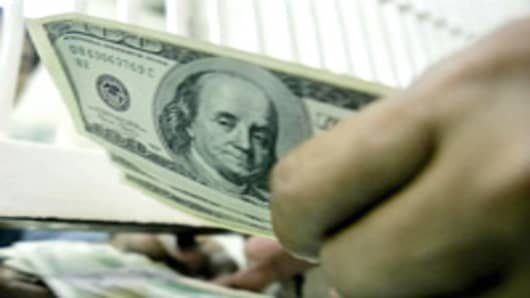The dollar fell Tuesday as U.S. inflation data added to concerns about the economy's strength and raised doubt about whether the Federal Reserve will be able to hike interest rates this year.
Surging German producer prices, on the other hand, lifted the euro, which hit a three-week high at $1.5674 after the head of a German think tank said he expected euro zone interest rates to soon rise.
"The inflationary pressures in Europe are relentless, and that's driving the euro higher," said Boris Scholossberg, senior currency strategist at DailyFX.com in New York.
He said that a weaker-than-expected 0.2 percent rise in U.S. producer prices last month adds to the concern sparked by a recent survey showing U.S. consumer sentiment at its lowest level since 1980.
"This is really bothering the market, because last week people thought Fed easing was over and the economy had stabilized, but the numbers lately are causing doubt," Schlossberg said.
The euro was last trading up on the day against the dollar, while the dollar was down versus the yen.
Against a basket of six major currencies, the dollar was down 0.8 percent at 72.381, a one-month low.
Fed Vice Chairman Donald Kohn on Tuesday that interest rates appear to be at the right level to boost sputtering U.S. growth.
However, the situation may be complicated by data showing that so-called core producer prices, which remove food and energy, rose by a larger-than-expected 0.4 percent.
That complicates life for the Fed, which has reduced interest rates by 3.25 percentage points to 2 percent since September but has since signaled a pause.
"Nothing here to give the Fed a peaceful night's sleep, even allowing for the better-than-expected headline for finished goods that was helped by a fall in gasoline prices," said Alan Ruskin, chief international strategist at RBS Greenwich Capital in Greenwich, Connecticut.
The euro initially weakened when the closely-watched ZEW survey of German investor sentiment fell in May for the second straight month.
It recouped those losses after Wolfgang Franz, the president of the ZEW economic research institute, said he thought the European Central Bank would soon raise interest rates.
The ECB has kept benchmark rates at 4 percent for nearly a year as record oil prices keep pressure on inflation.
The euro was also supported by a rise in German producer price inflation to a 20-month high, which boosted the case for higher rates.
Schlossberg said a strong reading in Wednesday's Ifo survey of German business sentiment could push the euro back toward all-time highs above $1.60.
However, signs of slower euro-zone growth have complicated the rate outlook, leaving markets uncertain about the bank's next move.
Franz's warning that the robust first-quarter growth seen in the euro zone's largest economy would not continue added to the confusion.
There was little reaction in currency markets to the Bank of Japan keeping its borrowing costs on hold at 0.50 percent as expected on Tuesday.
The Australian dollar hit a 24-year high of $0.9617 against the greenback, according to Reuters data, after minutes from the central bank's last policy meeting revealed the board discussed raising interest rates, suggesting future hikes may be in store.


